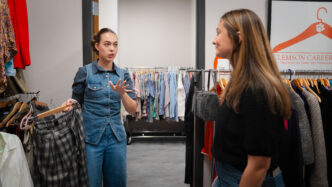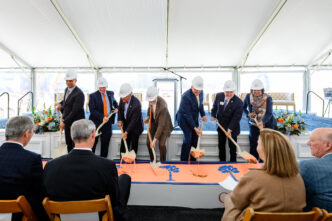A class of Clemson University Honors College students developed a series of podcasts exploring the National Academy of Engineering’s Grand Challenges for Engineering identified for the planet.
Developed by an international committee, the challenges were designed as “game-changing goals for improving life on the planet” and fall into four themes: sustainability, health, security and joy of living.
The multidisciplinary focus of the challenges made these goals an ideal topic for an Honors seminar, which are open to students from any major. When designing the class, Civil Engineering Lecturer Farhang Forghanparast also saw an opportunity to encourage students to embrace their own unique skills, backgrounds and areas of expertise as part of the learning process.
Students were divided into groups of three or four and tasked with creating a three-episode podcast series. Every podcast explores one of the grand challenges in-depth, including researching the topic, creating an overall plan and outlining each episode before their recording sessions.
Forghanparast has some experience with podcasting, having led one before he came to Clemson. He liked the idea of giving the students an opportunity to be creative, by combining research and storytelling.
I always thought that it’s a quite interesting medium, because it allows you to approach a topic in different ways. In college we do a lot of reports, presentations and papers, but we rarely create something that is a pure auditory experience.
CLEMSON UNIVERSITY CIVIL ENGINEERING LECTURER FARHANG FORGHANPARAST
The podcasts produced by each group exceeded Forghanparast’s expectations. Some of the students hosted conversations with guests, while others took a more conversational tone.
Regardless of the approach the students chose, every single episode was produced at a higher quality than Forghanparast had expected from first-time podcasters.
“The students came up with all of these diverse ideas and ways to tackle their challenges. Some came up with games, others with interviews, and some shared pure scientific facts,” said Forghanparast. “Encouraging their creativity led to an outcome that was both diverse and interesting.”
Griffin Dunn, a health sciences major and aspiring physical therapist, said that he was initially attracted to the Honors seminar because it met a global challenges requirement —but also because creating a podcast was something he had never done.
As the class progressed, however, Dunn realized that several of the engineering challenges had applications to the medical field.
“Other students in the class were also health science or nursing majors, so we often shared our views and our knowledge on discussion posts,” said Dunn. “It was cool to see how they would relate some of the engineering challenges to medicine.”
Dunn focused on engineering better medicines for his main project, which helped him apply his health sciences knowledge and skills in a different way.
Another student in Dunn’s group, civil engineering major Lillian Harrell, said that working in a group of people with other majors and interests brought other perspectives to the project and helped her see certain issues through a broader lens.
“We all had different strengths that we brought to the project and I enjoyed hearing what everyone knew about a topic, whether it was from their academic background or just their life background,” said Harrell. “I really like doing group projects like this, because it’s fun for me to see and value what other people bring to the table.”
The group’s biggest challenge arrived in the form of Hurricane Helene just before they had planned to record their podcast episodes. With the power out in homes throughout the area and the University closed in the storm’s immediate aftermath, Harrell brought the team to her apartment to finish their recording.
Above all, Harrell says she is grateful the class introduced her to Forghanparast.
“He is very, very kind. He takes a genuine interest in you and shows that he listens and cares,” said Harrell. “He had a sweet outro to the class, expressing that he would always be there for all of us and that he really cared about everyone. It was just really cool.”
Dunn agrees. “Dr. Forghanparast was a really awesome professor. This was also one of the first classes I had taken where I was talking with other people in completely different fields which broadens your horizons a little bit and can maybe spark an interest in somebody that they might not have known about before.”







